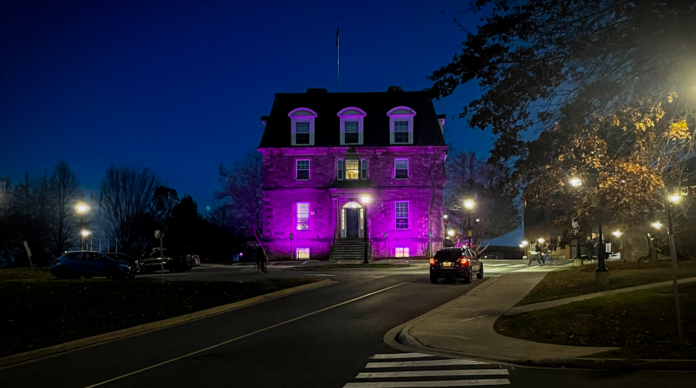

This November, St. Thomas University has added purple lights in the cupolas of two campus buildings, George Martin Hall and Holy Cross House, in recognition of Family Violence Prevention Month.
Proclaimed by the Government of New Brunswick in partnership with the Fergusson Foundation, the month aims to raise awareness of the impact that family violence has on individuals, families and the broader community.
But for those working in family support services, this awareness lasts year-round.
Ashtyn Morrell is a third-year student at STU who has been working with Capital Family Services since May. Her job as a family support worker includes providing transportation for children and guiding families while they move homes.
For Morrell, the most impactful part of her job is “the trauma that a lot of kids and even the adults have endured.”
“It’s seeing the impacts of everything and how it has affected them,” she said.
Since the start of her job, she has been working with a client with a young child and newborn to move into a house.
“I was in the process of moving them in there and getting them set up,” she said. “That was cool to be a part of.”
November is a very busy month at the Women in Transition House, but it’s not because of the campaigns for Family Violence Prevention Month. The organization’s mission remains the same throughout the year and they depend on external sources to help spread awareness about it.
“I would like to say that we have a whole media campaign around [Family Violence Prevention Month] in November, but staff are not able to do that,” said Executive Director Jan Smith.
The Women in Transition House first opened in the 1970s and has been fully functional for more than 40 years, with the goal of supporting women and children who are fleeing unhealthy and dangerous living situations.
Due to mental health, the cost of rent and food insecurity, “people are presenting with more complex needs than ever before,” said Smith.
“All of those social pressures create more internal pressures in a family … sometimes those internal pressures play out in inappropriate ways.”
Smith was previously a police officer and joined the Women in Transition House five years ago to help an underserved community. She described it as an easy transition with the diverse experience she gained as a police officer.
She made the switch because she saw “the need was there.”
Smith said that, if she could highlight one important fact, it would be that violence doesn’t have to be physical. Violence could be emotional or financial coercion, as well as threats and intimidation.
Her hope is that those affected know they are not alone and that they will seek an expert’s assistance for support and education.
“It exists in your own neighbourhood, no matter how affluent or marginalized that neighbourhood is.”
